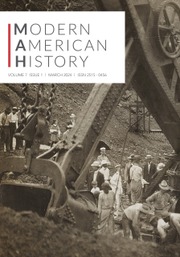No CrossRef data available.
Article contents
The Real Lives of Fake People
Published online by Cambridge University Press: 17 October 2018
Extract
Don Quixote is remembered as a dreamer, but he was, in the first instance for his creator, a cautionary tale about the bewitching danger of reading fiction. When Cervantes wrote what is considered to be the first modern novel, he did so having witnessed the explosion of printed texts thanks to the invention of the printing press, and his story chronicles what happens to hapless readers who are sucked into the dreamy world of fiction's unreality. Poor Don Quixote envisioned himself as a swashbuckling knight like those in the chivalric stories he consumed, and his metastasized imagination got him into heaps of trouble. He mistook inns for castles, flocks of sheep for advancing armies, and, most memorably, windmills for giants. Cervantes did not just give readers a unique portrait of an outlandish, romantic, and impractical schemer—he also inspired the word “quixotic” to describe others like him.
- Type
- Into the Stacks
- Information
- Copyright
- Copyright © The Author(s) 2018. Published by Cambridge University Press
References
1 von Goethe, Johann Wolfgang, The Sorrows of Young Werther, trans. Rose, William (London, 1929), xxivGoogle Scholar.
2 Vermeule, Blakey, Why Do We Care About Literary Characters? (Baltimore, MD, 2010), 49Google Scholar.
3 Rosen, Jeremy, Minor Characters Have Their Day: Genre and the Contemporary Marketplace (New York, 2016)CrossRefGoogle Scholar.
4 Booth, Wayne C., The Company We Keep: The Ethics of Fiction (Berkeley, CA, 1988), 157Google Scholar.
5 Cotkin, George, Dive Deeper: Journeys with Moby-Dick (New York, 2012), 156, 127CrossRefGoogle Scholar.
6 Greil Marcus, as quoted in ibid., 12.
7 Bloom, Harold, ed., Jay Gatsby (Philadelphia, 2004), 1Google Scholar.
8 Anthony Lewis, “Abroad at Home; The Great Gatsby,” New York Times, Aug. 6, 1987, https://www.nytimes.com/1987/08/06/opinion/abroad-at-home-the-great-gatsby.html (accessed July 9, 2018).
9 Clark's, Beverly Lyon The Afterlife of “Little Women” (Baltimore, MD, 2014)Google Scholar, develops this as well.
10 Sicherman, Barbara, Well-Read Lives: How Books Inspired a Generation of Women (Chapel Hill, NC, 2010)Google Scholar, 1, 4.
11 Simone de Beauvoir, as quoted in ibid., 28.
12 Cynthia Ozick, as quoted in ibid., 14–15.
13 Ann Petry, as quoted in ibid., 30.
14 Lepore, Jill, The Secret History of Wonder Woman (New York, 2014), xiiiGoogle Scholar.
15 Lepore, Wonder Woman, 293, xiii.
16 Crespino, Joseph, Atticus Finch: The Biography: Harper Lee, Her Father, and the Making of an American Icon (New York, 2018)Google Scholar, 141, 150.
17 Spingarn, Adena, Uncle Tom: From Martyr to Traitor (Stanford, CA, 2018)Google Scholar, 1, 3, 207, 131.


